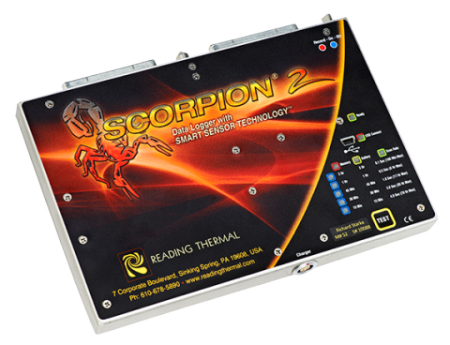Are your industrial ovens experiencing inconsistent product quality, moisture retention problems, uneven bakes, or low production capacity? Validating the temperature uniformity with help from Reading Thermal may be the answer.
Reading Thermal has focused on measuring and understanding the commercial baking process for 25-plus years. We manufacture and support the SCORPION® 2 Data Logging Measurement System, a profiling system that has become a standard in the baking industry and also provides an easy way to validate your Kill Step for food safety.
Importance of Measuring Oven Temperature
Oven temperature causes chemical and physical reactions in batter and dough. Temperatures that are too low or too high can lead to changes in fermentation and humidity levels and cause undesirable fluctuations in texture, surface coloring, and flavor.
An oven that is too cool will typically produce a dense and unappealing loaf that has a pale or soft crust, while too much heat can cause the bottoms of the products to burn before their crusts brown properly.
Measuring and controlling internal food temperature is also the key to food safety. The Food Safety Modernization Act (FSMA) requires commercial bakeries to provide validation of process controls, or thermal kill steps, in an effort to reduce foodborne pathogens, such as Salmonella, Listeria, and E. coli in ingredients and finished products.
How to Measure Oven Temperature
Reading Thermal designed the SCORPION® 2 Temperature Sensor Array to measure the temperature at product level. It is connected to the SCORPION® 2 Data Logger and travels through the oven with the product, yielding a precise picture of temperature from side-to-side and end-to-end.
Different types of pluggable sensors are available, including one created for solid or tight mesh conveyors and one for open mesh conveyors.
After gathering data, the SCORPION® Software (SV8) Food Safety Module makes it easy for bakeries to calculate lethality and helps you optimize your process and products while meeting food safety standards.
One large bakery client, for example, employed the SCORPION® 2 Data Logger and Temperature Sensor Array to calculate the ideal baking time for a wheat sandwich line it was making in an 84-foot continuous impingement tunnel oven with eight zones.
They discovered that internal dough temperatures were reaching 200°F at 74% of the way through the baking cycle instead of at the target of 85%. By reducing overall temperatures by about 15°F and slowing internal baking, the bakery was able to save thousands of dollars per month on natural gas.
SCORPION® Profiling Service
Reading Thermal also offers the SCORPION® Profiling Service to assist customers at their own locations with problem-solving. The state-of-the-art SCORPION® Data Logger is used to collect thermal profiles of temperature (air, band, product), air velocity, heat flux, and humidity. We have the ability to analyze a single line or perform multi-line comparison studies to determine what is causing problematic processing conditions and to recommend solutions.
Validating the temperature uniformity of your industrial ovens with the SCORPION® 2 Data Logging Measurement System from Reading Thermal will provide you with the information you need to make reliable data-based decisions about your processes and products. Contact us online, or call us at (610) 678-5890 Ext. 2 to learn more about our innovative products.

